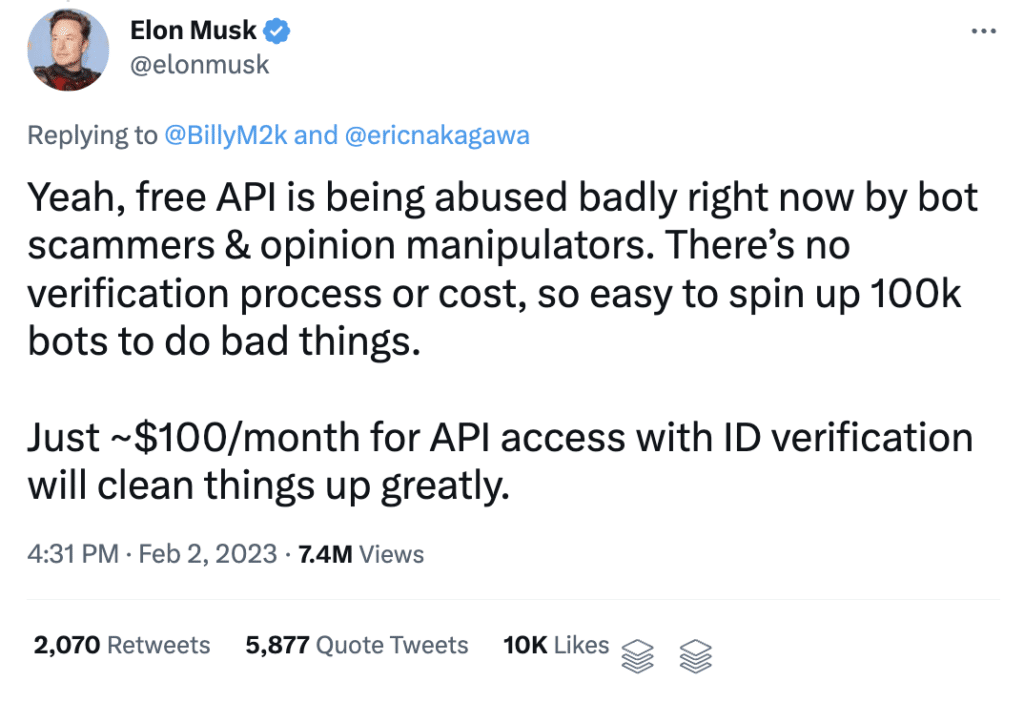Twitter API Changes Set to Disrupt Public Interest Research
Justin Hendrix / Feb 6, 2023On Thursday, February 2, a tweet from Twitter's Development team announced that as of Thursday, February 9, the platform will no longer allow free access to the Twitter API. Instead, the company and will introduce paid access. The announcement came two weeks after Twitter moved to limit access to its API to certain third parties, part of a wave of changes on the social media platform since billionaire Elon Musk acquired it last fall.
Musk tweeted that the company may charge $100 a month for API access, and that the motivation behind the change is to limit abuse by "scammers & opinion manipulators."

But many organizations using the API are doing so in the public interest. Aside from companies that rely on the API to track Twitter activity that is relevant to their business interests, the API is used by thousands of journalists, academics, civil society groups and other researchers to study a wide variety of phenomena on the platform. Limiting access to the API may cripple projects on issues ranging from national security to mental health, break systems that generate automated alerts about events such as natural disasters, and strangle access to crucial information for a range of other applications that are in the public interest.
"The loss of these APIs is going to be a huge blow to our ability to understand Twitter's influence on our public lives and our democracy," said Brandon Silverman, founder and former CEO of CrowdTangle, a social analytics firm acquired by Facebook, and now an advocate for greater transparency from technology firms. "It's going to undercut thousands of research projects that not only help us understand the role of Twitter in our lives over the long-term but also help protect our elections, help keep people vulnerable communities safe, monitor for harassment & bullying and more."
The recently formed Coalition for Independent Technology Research, a group of close to 200 journalists, university and civil society researchers that "works to advance, defend, and sustain the right to study the impact of technology on society" (of which I am a member), today issued a letter of concern about the announced changes to the API, saying it may affect public interest projects including "crisis response for wildfires and hurricanes, national security, public health, consumer fraud, polarization, economic analysis, child safety, mental health, online violence, inauthentic activity, including spam and bots, and much more."
Calling access to the data "a fundamental building block of transparency and accountability," the coalition called on Twitter to ensure API access "remains easily accessible for journalists, academics, and civil society," and "on policymakers to demonstrate leadership and require reliable public-purpose data access for all to protect this vital infrastructure."
"We haven’t received any clarity about the details of this policy, including who or what is covered. Nor do we know anything about the plan’s pricing-- beyond Musk’s tweet, that is," said Rebekah Tromble, Director of the Institute for Data, Democracy & Politics at The George Washington University and a member of the coalition's executive committee. "Researchers have to proceed under the assumption that our access will be cut off on Thursday, and we’re scrambling to salvage what we can in that short timeframe."
At least one member of Congress is also raising concerns about the move.
“Twitter should be making it easier to study what’s happening on its platform, not harder," said Rep. Lori Trahan (MA-03), a member of the House Energy and Commerce Committee’s Innovation, Data, and Commerce Subcommittee, in a statement. With other members, Rep. Trahan introduced legislation in 2022 that would have mandated access to platform data for researchers, and in November 2022 she joined Rep. Sean Casten (IL-06) to send a letter to Musk regarding Twitter’s transparency policies and researcher access.
Independent researchers have specific concerns about the changes. Kaicheng Yang, a researcher at the Observatory on Social Media at Indiana University leading the development of Botometer, a tool to detect social bots on Twitter that is used daily by thousands of people to identify potential manipulation, told me that "if Twitter decides to charge for the API, even at a very low price, it will destroy our current model. We will have to either terminate the tools or charge people for using them, which is not ideal for average users."
Yang also took issue with Musk's motivation to use a fee to address abuse of the API. He says it may not be so simple.
"Many bot creators on the black market use simulated Android systems to control the Twitter client directly to access their bot accounts these days," said Yang. "It’s the researchers like me who heavily depend on access to the API. Adding restrictions to the API will hurt our ability to identify bad actors online the most."
Libby Hemphill, an associate professor at the University of Michigan affiliated with Center for Social Media Responsibility says even if researchers are ultimately made to pay, a week's notice from the company is simply not sufficient.
"I'm concerned about how data access policy changes happen so fast that researchers can't adjust without threatening their projects," said Hemphill. "I understand needing to monetize (not the same as supporting it), but a week's notice is ridiculous. Facebook's abrupt API shutdowns followed this approach too, and researchers can't refactor code or raise resources fast enough to pivot on a dime."
Requirements in Europe's Digital Services Act around researcher access to platform data will eventually be in place, and should help lead to the normalization of such access. Legislation has been put forward in the U.S. that would carry similar requirements, including the Digital Services Oversight and Safety Act announced last year by Rep Trahan and her colleagues in the House, and the Platform Accountability and Transparency Act introduced in the Senate by Sens. Chris Coons (D-DE), Rob Portman (R-OH), Amy Klobuchar (D-MN) and Bill Cassidy (R-LA).
GWU's Rebekah Tromble says this incident proves the necessity of transparency mandates.
"Twitter is potentially going from 'best in class' when it comes to researcher data access to worst," said Tromble. "At a time when other large social media platforms are expanding their data access programs—primarily in response to new transparency requirements laid out in the EU—Twitter appears to be moving in the opposite direction. And they’re demonstrating precisely why these transparency mandates are needed."
Authors

